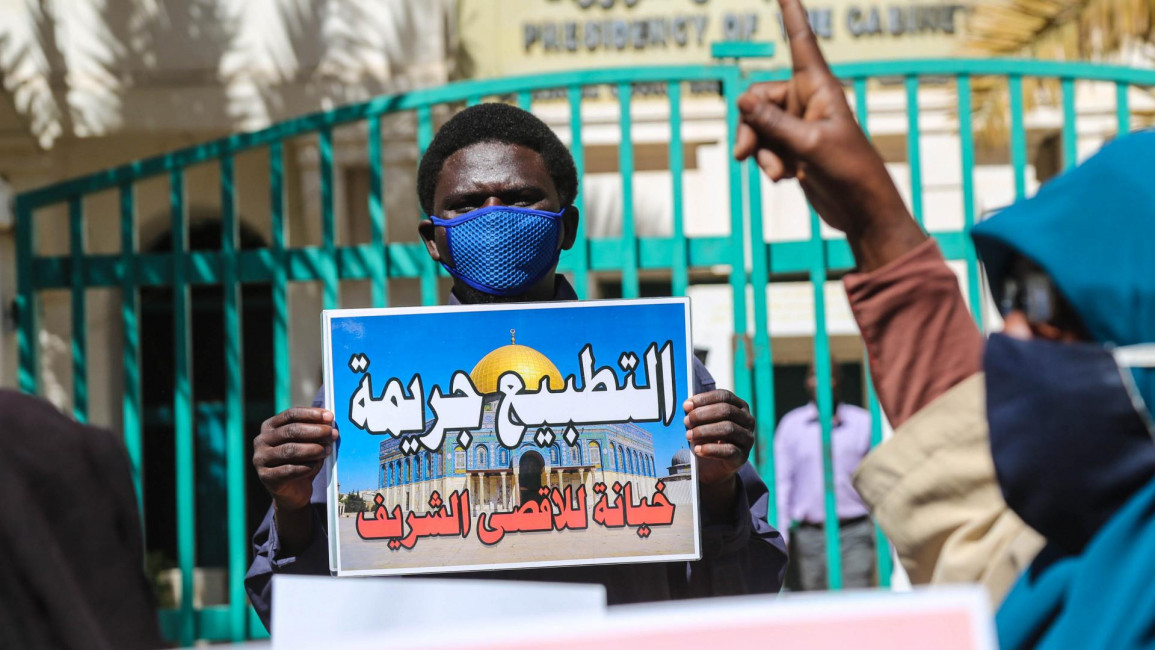Dozens of Sudanese parties denounce government's repeal of Israel boycott bill
Last week, Khartoum's cabinet voted to repeal a 1958 law that forbade diplomatic and business relations with Israel.
"The Council of Ministers has approved a bill (repealing the 1958 boycott of Israel law) for the year 2021," the cabinet said in a statement.
The law was in line with the policies of Arab nations at the time towards Israel.
The move created a political backlash, with more than 24 parties releasing statements against it, Middle East Monitor reported.
Over the weekend, Sudan’s Arab National Congress, the Islamic National Congress and the General Congress of Arab Parties released a joint statement condemning the abolition of the bill.
"In 1958, Sudan criminalised all dealings with the Zionist entity in expressing the authentic, established views of the Sudanese people towards their solidarity with Palestine,” the statement read.
The signatories added that the transnational government is acting illegitimately and the Sudanese people are aware of this fact.
Last week, Sudan’s Umma Party said the transitional government has "exceeded its authority by authorising the abolition of the 1958 Boycott of Israel Law."
The party called for "cancelling the bill and postponing any controversial issues until an elected legislative council is formed,” adding that such decisions threaten Sudan’s internal stability and unity.
This comes six months after Sudan normalised ties with Israel, following in the footsteps of the United Arab Emirates and Bahrain.
The decision was a controversial one that sparked protests in Sudan, particularly due to Israel's continued occupation of Palestinian territories.
Last month, fourteen political movements and parties in Sudan called on the country's normalisation process with Israel to be halted until general elections are held.
The signatories of the statement stressed that continuing with the normalisation agreement would expose the Sudanese transitional government to further divisions at a sensitive point in the country's history.
The group said they recognise the complexities Sudan faces during its path to democracy but that the country must not give up on its insistence on a two-state solution to the Palestine-Israel conflict.
"It [Sudan] is heading towards a solid democratic transformation, full transparency and liquidation of the legacy of the worst fascist regimes in its history, and the transitional period faces many pitfalls and difficulties," the statement read.
Follow us on Facebook, Twitter and Instagram to stay connected


![Minnesota Tim Walz is working to court Muslim voters. [Getty]](/sites/default/files/styles/image_684x385/public/2169747529.jpeg?h=a5f2f23a&itok=b63Wif2V)




![An Israeli air strike on Jabalia killed teenage journalist Hassan Hamad [Screengrab/X]](/sites/default/files/styles/image_330x185/public/2024-10/hassan%20hamad1.jpg?h=c12e0b96&itok=Rd_dyCVp)

![Israeli strikes on Beirut [Getty]](/sites/default/files/styles/image_330x185/public/2176155077.jpeg?h=a5f2f23a&itok=Xq7ypWgM)